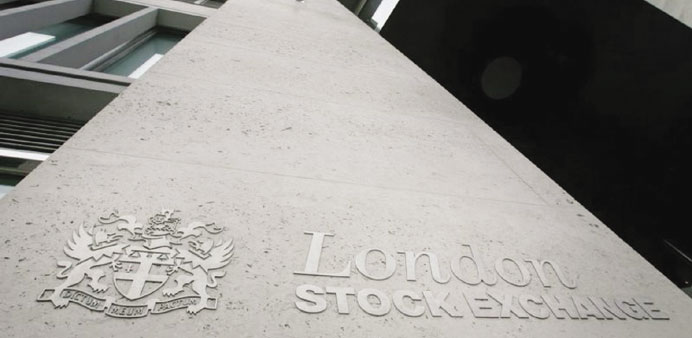The outside of the London Stock Exchange building is seen in London. The LSE will offer 74,347,813 new shares at a price of 1,295 pence, a 30.1% discount to its August 21 closing price.
Reuters/London
The London Stock Exchange Group said yesterday it would raise £938mn ($1.6bn) in its first rights issue to part fund the acquisition of US indexes group Frank Russell.
LSE will offer 74,347,813 new shares at a price of 1,295 pence, a 30.1% discount to its August 21 closing price. Shareholders will have the right to buy three new shares for every 11 already held.
The new ordinary shares represent 27.3% of the existing share capital and would be 21.4% of the enlarged issued share capital, following the rights issue.
Europe’s oldest independent bourse unveiled plans to buy Frank Russell for $2.7bn in June to move deeper into the US financial services market, where half of global assets under management (AUM) are based. LSE said then it would help fund the purchase by issuing new stock.
The deal would give LSE, which owns indexing business FTSE, third place in the booming market for exchange traded funds (ETFs), low-cost funds that provide an alternative to active fund management, behind market leaders S&P Dow Jones and MSCI .
The discount is at the lower end of the typical 30 to 40% range seen in similar recent UK deals, such as defence firm Babcock’s $1.8bn rights issue. Its shares were offered at a 34.5% discount, according to data compiled by Barclays.
David Warren, LSE’s chief financial officer, said the size of the discount showed there was strong support for the Russell deal. “We have been in close contact with our major shareholders since the time of the transition announcement in late June and at various intervals since, and there has been positive reception to the acquisition.”
LSE shares, which have risen about 1% since details of the acquisition and rights issue were given in June, were little changed at 2,004 pence at 1208 GMT.
The rights issue has been fully underwritten by Barclays , RBC Capital Markets, Deutsche Bank, JP Morgan Cazenove, Banca IMI, Banco Santander, HSBC and Mitsubishi UFJ Securities . It is due to complete by the end of September.
LSE will pay the remaining $1.1bn for Frank Russell with its existing multi-currency bank debt facilities. The deal, which is expected to boost earnings in the first full year after the merger, will create an index compiler with some $9.2tn of assets benchmarked against the performance of its market measures, which include the UK’s FTSE 100.
Russell, founded in 1936 and based in Seattle, owns an index division that operates equity benchmark gauges, such as the Russell 2000 Index, and an investment management arm with assets under management of $256bn. Warren gave no update on LSE’s plans for Russell’s asset management arm.
The company said in June it was working with Russell’s Chief Executive Len Brennan to determine its fit with the enlarged group.
The review is expected to be completed around the transaction closes, estimated at the end of the year. Brennan will then join LSE’s executive committee.
LSE said it intends to continue paying dividends on a progressive basis after the Russell deal, with future payments adjusted to take account of the increased number of shares.
Earlier, LSE reported a 36% increase in operating profits to £102mn in the three months through June 30, while revenues climbed 20% to £300mn.
Warren said the group had made a positive start to the year, seeing good trading in equities and fixed income in July, and so far in August. The number of new issues on its markets also rose in July from a year earlier.

